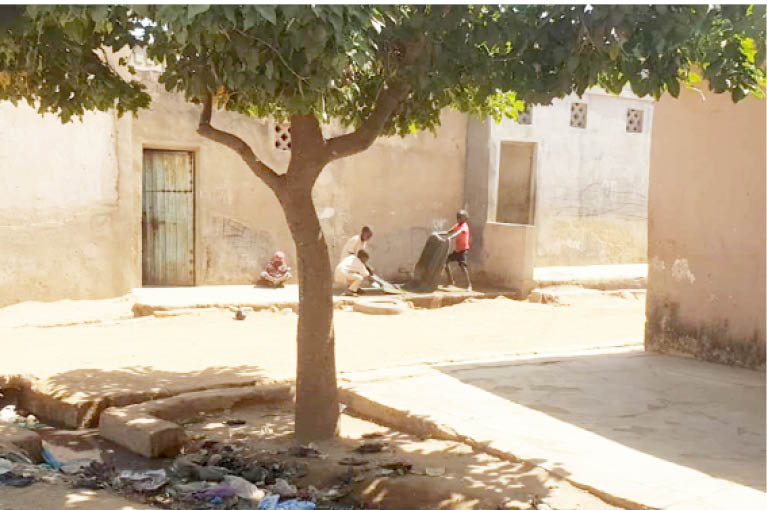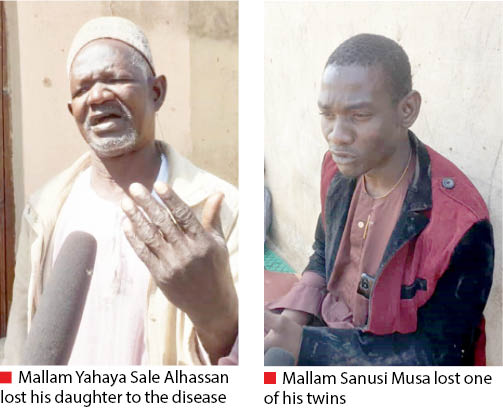Low awareness among Kano residents as diphtheria cases spike
Mallam Sanusi Musa sits still, as neighbours gather around him to condole with his family over the death of his child, due to the outbreak of diphtheria in their area. He was not only worried about the death, but the fact that his other child – a twin, is currently in the hospital being treated […]

A part of the community where the disease is prevelant
Mallam Sanusi Musa sits still, as neighbours gather around him to condole with his family over the death of his child, due to the outbreak of diphtheria in their area.
He was not only worried about the death, but the fact that his other child – a twin, is currently in the hospital being treated for the disease. He’s confronted with the fear of losing another child to the new killer-disease he and those around him know little or nothing about.
“I lost my son to this disease that I have never heard about. After his death, one of my twins is also down with the disease. He is currently in isolation at the hospital. We are lucky his twin brother was not infected. My prayer is for the boy to recover from this deadly disease,” he said worriedly.
Like Musa, many other houses in Bare Bari and Tudun Rubudi communities of Ungogo Local Government Area have been thrown into mourning due to the outbreak of Diphtheria. The index case was said to have come from the two densely populated communities and over 15 people have so far died in the area.
Despite budgeting billions, Kaduna’s rural communities lack potable water
Step up immunisation to curtail diphtheria
Malam Yahaya Sale Alhassan, whose daughter was said to be the index case, said she started with fever after which it turned to something strange.
“The girl started showing strange symptoms; we thought it was fever, but later, she started swelling by her sides, and then we took her to the hospital.
“After we returned home, some days later, she started coughing out blood and was not eating. Even if you feed her, it doesn’t pass through, it comes out mixed with blood. That’s when we realized that the matter was too serious for us to handle at home so we took her back to the hospital. It still persisted and that was how we lost her. Two of her brothers started showing symptoms but they later became okay,” he said.
The outbreak of diphtheria in Kano was announced by the state government on January 19, but was said to have been first noticed in the state in late 2022. About 100 suspected cases of the disease were documented while at least 25 patients, majorly children, have reportedly died of the infection.
According to the state ministry of health, from the time the outbreak of the disease was discovered to date, it has spread across 13 local government areas with 100 suspected cases recorded. Out of the 100 cases, eight were confirmed. They said while 27 patients are on admission, 41 have been managed and discharged successfully.
Speaking to Daily Trust Saturday, the state epidemiologist, Dr Abdullahi Isa Kauran Mata, said “Out of the confirmed cases, we recorded only 3 deaths. But 18 suspected people also died before they were tested, so we are not sure whether they died from the disease suspected to be diphtheria.”

However, despite how fast the disease is spreading across the state in a very short period, residents seem to be unaware of it, Daily Trust Saturday gathered.
Many people interacted with in Kano described the disease as unknown to them, while others said that they are not yet aware of its symptoms.
When Daily Trust Saturday visited the two communities where the index case started, people were going about their normal schedules without observing any of the set-out measures to curb its spread. Despite being a communicable disease, which shares some similarities with COVID-19, nobody was sighted in the community with a facemask, neither was there any observance of social distancing and hands sanitizing.
A member of one of the communities, Dahiru Idris, said he was not even aware of the outbreak of the disease, and that he only heard that there was a disease that killed some children in the area. “One of my friends told me that two people died in this area and it was from a strange disease. But honestly, I didn’t even know its name until you asked me now,” he said.
Similarly, another resident of Tudun Fulani, a neighbouring community, Sani Jibrin, said he’s never heard of the disease until recently while listening to the radio. He said although he learned that it started from a community next to his, he’s not taking any measures to avoid contracting it, and is not even aware of its symptoms.
Ibrahim Abdullahi, another affected victim who lost his son, said his seven-year-old boy died before he got to hospital, and the symptoms mentioned on the radio were similar to what he experienced.
He said because people are not aware of the disease, some didn’t even believe in the outbreak, adding that they go on with their normal businesses.
“My boy was seven years old; he started with a fever, he later felt okay and then his neck got swollen. We thought it was something else that we were used to and started medication, unfortunately, he died. Honestly, we didn’t take him to the hospital,” he said.
As the outbreak continues to claim lives, especially children, parents and teachers are beginning to express fear and looking at ways to bring it under control.
Auwal Musa, a primary school teacher and headmaster at a private school in Kano, said they have started putting precautionary measures in place to safeguard the children from being affected.
“It’s a communicable disease as we learnt. So, we have already asked all students and pupils to start wearing facemasks and enforce the use of sanitizer,” he said.
He advised that while the schools are doing their part, parents should pay close attention to their children and if they see any symptoms, should stop them from coming to school until they are certified okay by a physician.
Also speaking, a parent, Amina Abubakar, called on other parents to be more focused on their children’s personal hygiene and ensure they are fine before going out and when they return home.
“I would like to advise that when we see any symptoms with the children, we shouldn’t panic but take them to hospital for proper medical attention. Practicing proper hygiene is very important also when at home and after going out,” she said.
This is even as another parent, Emmanuel Okoye, said he has refused to allow his kids resume school after hearing about the outbreak.
“You know they came back from Christmas holidays late. In fact, their school resumed two weeks before they came back from the village, only for us to hear about this outbreak when they wanted to resume. So, I told my wife to keep them at home for a while. Let’s see how things pan out,” he said.
Medical experts speaks
Speaking on the symptoms and measures to be taken, a medical doctor and the chairman of E-Health 360, Doctor Najib Usman, attributed failure of parents to routinely vaccinate their children and change in the weather to the outbreak, adding that it shares similar symptoms with COVID-19 but there are differences.
“Diphtheria is a respiratory issue caused by bacteria. It presents symptoms like fever, cough, sneezing, running nose, swollen eyes, voice cracking and then neck swelling and a white patch on the back of the throat,” he explained.
He said since it is a respiratory disease, it can spread with tiny droplets when one coughs or sneezes.
“Staying in an overcrowded location where people are coughing can put one at risk. Also, one can be at risk when coming in contact with someone or maybe an object that has a deposit of Diphtheria bacterium without proper sanitation and hygiene. It’s highly communicable,” he added.
On the issue of whether it affects only children, Doctor Usman said “It affects all age groups. Only that children are more vulnerable, they are growing and their immune system is not as strong as that of an adult, so they are more likely to be affected.
“But that doesn’t mean that adults are immune. The best thing that can protect someone is vaccination. So, an adult that is not vaccinated is as good as a child that is not vaccinated. It’s the same thing. If someone takes just a dose or two, he or she is not fully vaccinated.”
The medical practitioner advised that there is a “need to do more on awareness because honestly, when we don’t do awareness, many people will come down with it. For instance, within a week, in Kano, we had more than 100 cases which were identified successfully. More than 33 people are dead in Kano.
“Recently, just yesterday (Wednesday) I met a woman who lost three out of her four kids to Diphtheria. So, you see, it’s a very serious issue.”
Meanwhile, the state commissioner for health, Dr Aminu Ibrahim Tsanyawa, said the state government is putting all hands on deck to control the situation by embarking on awareness campaigns through radio stations, and also calling on parents to ensure their children are vaccinated to avoid being infected.
